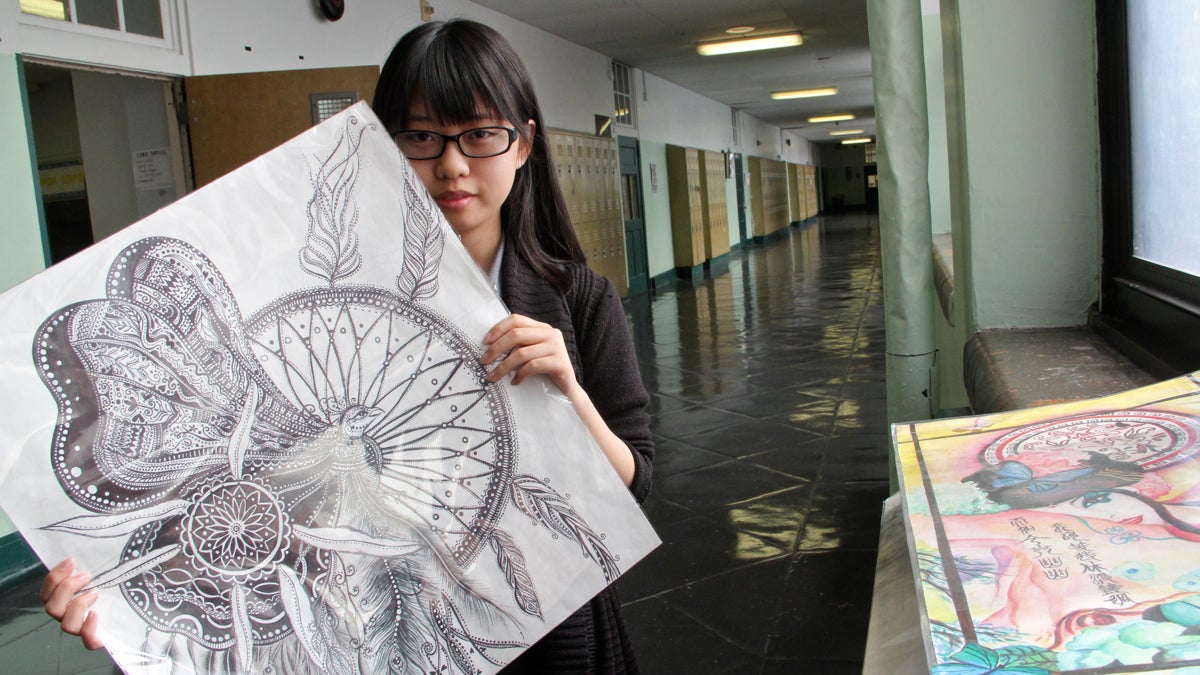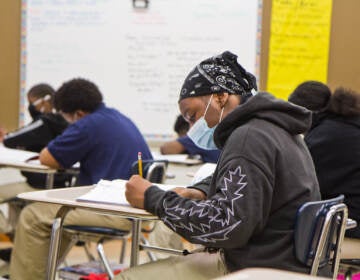Non-native speakers feel lucky to graduate before Pa. Keystone test requirement
Listen
Xiuying Zhang, a senior at Furness High School, could not pass any portion of the Keystone exams. She has been accepted to University of the Arts and hopes to become a professional illustrator. (Emma Lee/WHYY)
Starting with the Class of 2017, Pennsylvania students will need to pass standardized tests in literature, algebra and biology in order to earn diplomas.
Furness High School senior Xiuying Zhang has an artistic gift. The vibrant colors and nuanced shadows of her paintings and illustrations make her classical Asian motifs sing.
In the fall, she’ll attend the University of the Arts, where she’ll take the next step toward her dream of being a professional illustrator.
If this were 2017, though, it’s highly likely she would not be graduating high school.
Why? Because she couldn’t pass state Keystone exams in algebra, literature and biology.
“First year I try really hard, but I did not pass. I almost passed it,” she said, with a thick Cantonese accent. “But I didn’t make it.”
Zhang moved to Philadelphia from Hong Kong three years ago. She’s made steady gains in learning English, but not enough to score as proficient on a literature test. Biology, though, has given her the most trouble.
“I don’t know how to do it,” she said. “I’m not good at biology.”
Pennsylvania doesn’t currently have a standardized graduation test. Students graduate from high school by completing a set amount of coursework: four years of English; three each of math, science and social studies; two of arts or humanities; one of health and physical education; as well as five additional elective courses in subjects such as music, computers and foreign language.
Within these guidelines, the state’s 500 school districts have autonomy to evaluate student performance and decide who earns a diploma.
Currently, the state’s graduation rate sits at 86 percent.
But this will all soon change.
Starting with the Class of 2017 – this year’s sophomores – Pennsylvania students will need to pass standardized tests in literature, algebra and biology in order to earn diplomas.
Lawmakers have dubbed the tests the “Keystone exams,” and they are aligned with the PA Core Standards, the state’s version of Common Core. They’ve been administered since the 2012-13 school year, but results, so far, haven’t affected students.
‘Don’t know much about science book…’
The looming changes, though, are causing concerns.
Zhang’s struggles with biology are mirrored elsewhere throughout the state.
Last year, just 54 percent of the state’s high-schoolers scored well enough on the biology exam to pass.
While scores were most dismal in the state’s poor, urban centers, many posh suburban districts also have reason to be wary. In Lower Merion, a district on suburban Philadelphia’s affluent Main Line, the high school graduation rate is 96 percent, but just 71 percent passed the biology exam last year.
If students cannot pass one of the exams, they must take remedial coursework that prepares them to complete a computer-based project assessment. An independent panel will evaluate these on a pass/fail basis. Students are to work with tutors until they pass each of the required tests.
 Furness High School, in Philadelphia’s financially struggling school district, may not have the resources to help its students meet the new graduation requirements. (Emma Lee/WHYY)
Furness High School, in Philadelphia’s financially struggling school district, may not have the resources to help its students meet the new graduation requirements. (Emma Lee/WHYY)
But for the state’s many under-resourced districts – which have faced drastic downsizing in recent years – there’s a question about the levels of support that realistically can be provided.
Many districts are already scrambling to figure out how they will provide the remediation and support that students will need to succeed by 2017.
In Philadelphia, where the graduation rate in traditional public schools is 65 percent, the school district is bracing for a major downward slide once the Keystone requirement takes effect.
Based on the number of students currently passing all three tests, nearly 80 percent would need to pass at least one project-based assessment in order to graduate.
“I think that it’s crazy, because you don’t have to pass the Keystone for college or anything else,” said Zhang.
Zhang does not consider herself an academic slouch. Asked what she does for fun, she brought up the rigors of her Advanced Placement art course.
“I didn’t go out for a year for fun, because I stay home and draw,” said Zhang, whose work has been displayed by the Pennsylvania Academy of the Fine Arts.
Standardized debate
Especially for English-language learners like Zhang, advocates of the standardized test opt-out movement say the new requirements will needlessly hamstring students whose intellectual prowess can’t be measured by tests.
Others say it will push schools to devote even more precious classroom time to rote test preparation.
Proponents of the requirement, though, say the state needs to do a better job ensuring that all students are prepared for the modern job market. Giving credence to this point, 70 percent of students at the Community College of Philadelphia need to complete remedial high school-level work before moving on to college-level classes.
While the exam requirement may hold back some students, it may cause others to take the tests more seriously. This could be a good thing for schools whose reputations can quickly sour based on test scores. It could also help the educators whose performance is currently measured, in part, according to test results.
Furness senior Mohamed Ben-Abdullah, who moved from Tunisia three years ago, readily admits that he hasn’t been motivated to do his best on standardized tests.
 Mohamed Ben-Abdullah, a senior at Furness High School, did not pass his Keystone exams, preferring instead to focus on his AP courses. He has been accepted into the electrical engineering program at Widener University. (Emma Lee/WHYY)
Mohamed Ben-Abdullah, a senior at Furness High School, did not pass his Keystone exams, preferring instead to focus on his AP courses. He has been accepted into the electrical engineering program at Widener University. (Emma Lee/WHYY)
He’d prefer to focus on his AP courses, which, this year, are literature and calculus. That focus has made the four-sport athlete one of the school’s rising stars – helping him win a $22,000 presidential scholarship from Widener University to study electrical engineering.
“I’m a good student, but I didn’t really even take the test,” said Abdullah, who didn’t pass literature or biology. “It’s not going to affect me as a student. That’s what they told us. So I’m like, ‘OK.'”
Zhang echoed that sentiment.
“Last year they said if you are senior or junior, you don’t have to take the Keystone test to graduate,” she said. “So we didn’t take the Keystone seriously, and all the classrooms just sleep.”
WHYY is your source for fact-based, in-depth journalism and information. As a nonprofit organization, we rely on financial support from readers like you. Please give today.





